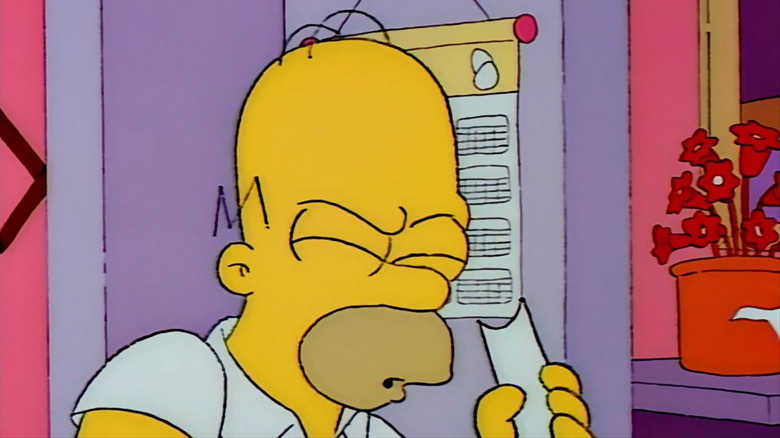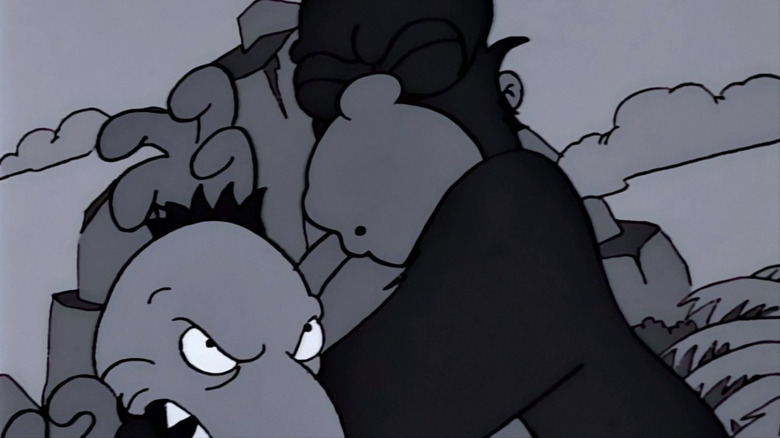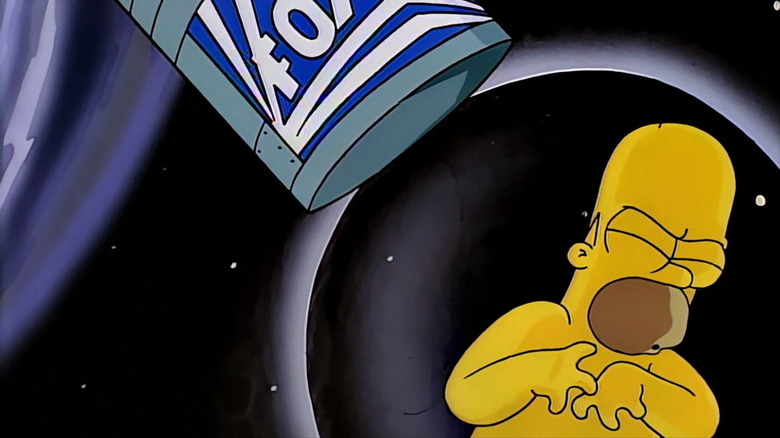Homer Simpson's Famous D'oh Catchphrase Has A Surprising Unscripted Origin
In the early days of Matt Groening's "The Simpsons," Bart (Nancy Cartwright) was seemingly intended to be the main character of the show. This makes sense when one considers that Groening named the Simpsons after his own family. Groening also has two younger sisters named Lisa and Maggie, his parents are named Margaret and Homer, and his grandfather was named Abraham. His mother's birth name was Wiggum, another name that made its way onto the show (albeit as the last name of Springfield's incompetent police chief and his dim-bulb son Ralph). Groening, then, seemed to be staging himself as the irascible, precocious youth of a new generation, or, in Bart's own words, the Dennis the Menace of the '90s.
As the show progressed, however, Homer (Dan Castellaneta), the paterfamilias, slowly began to emerge as the show's proper lead. In the first few seasons of "The Simpsons," Homer was presented as an only-somewhat-clueless blue-collar wonk whose primary concerns were sucking up to his boss and arranging his middle-class family so that they more closely resembled average suburban Americans. As the show progressed, however, Homer became bolder and more confident at the same pace he became almost supernaturally stupid. Homer went from being an embarrassed sad sack to nearly being a kooky Mad Hatter.
Homer's signature noise of frustration — his "D'oh!" – was born from the earlier portion of "The Simpsons," when Homer was more of a put-upon schlemiel. Back in a 2000 interview on "Late Night with Conan O'Brien," Castellaneta and O'Brien discussed their differing approach to Homer's celebrated interjection, arguing over its spelling and meaning (O'Brien wrote for "The Simpsons" in 1992 and 1993). Castellaneta also explained where the noise came from. It turns out he drew inspiration from old Laurel & Hardy shorts.
[Annoyed grunt]
In the interview, O'Brien recalled the arguments in the writer's room as to the spelling of Homer's eminent ejaculation. O'Brien said that many members of the staff wrote it as the now commonly accepted "d'oh!," although some writers spelled it out as "doe," which both O'Brien and Castellaneta thought to be a mite risible. "A female deer," Castellaneta jibes. Castellaneta, however, recalls first encountering the phenomenon in an early script — back when "The Simpsons" was an animated segment on "The Tracy Ullman Show" — when it was written down simply as the voice direction [annoyed grunt].
Indeed, it seems that, even to this day, 'd'oh!" is written in scripts as [annoyed grunt]. Groening left it up to Castellaneta as to what an [annoyed grunt] would sound like. Castellaneta, digging deep into popular culture, remembered a famously put-upon character from old Laurel and Hardy short films played by comedian James Finlayson. Finlayson had a peculiar annoyed grunt of his own, which Castellaneta imitated. It's a "d'oh," but it's more of an angry "da–!," cut off by a glottal stop, and followed by an annoyed, quieter "oooh!" The "Da–" part was, Castellaneta pointed out, a way for the character to avoid saying "damn" on 1930s TV. "D'oh" is, then, a "damn" interrupted by an "Oh!"
O'Brien gleefully points out that saying "damn" on television doesn't seem to be an issue any longer, as Castellaneta had just said it openly. Castellaneta prods back with a "F'oh!"
Classic cartoons
It's worth remembering that the founding members of "The Simpsons" were all born in the 1950s, and were raised on classic cartoons and comedy shorts from the decades prior. Watching old Robert Clampett cartoons or early Fleischer Bros. "Popeye" shorts will reveal quite a lot of Simpsons DNA. Castellaneta was born in 1957, and has gone on record about the origins of his exploration into funny voices and impersonations. Castellaneta used to listen to his dad's old comedy albums — one can imagine a lot of Abbott & Costello — and imitate what he heard. When it came time to voice Homer for "The Tracy Ullman Show," Castellaneta immediately began with a Walter Matthau impersonation. The voice eventually settled into the familiar, annoyed, grunting idiot we all know and love.
So while Homer may have been originally intended to be a blue-collar boob named after Groening's father — an updated sitcom dad for a cynical generation — he also was a direct link back to older cinematic and TV traditions. Just as Bart was this generation's Dennis the Menace, Homer was an all-new James Finlayson by way of Walter Matthau. Castellaneta has won six Emmys for his work on "The Simpsons." He also voices Grandpa, Groundskeeper Willie, Krusty the Clown, Barney, Sideshow Mel, Mayor Quimby, Hans Moleman, and literally a hundred others.
Castellaneta also has put out two records, "Two Lips: The Lost Album" in 2000, and a 2002 comedy record called "I Am Not Homer" which is a series of audio comedy sketches he recorded with his wife Deb Lacusta, a writer on "The Simpsons." Castellaneta is one of the funniest actors currently working, and may his career bring us many years of D'OH!


